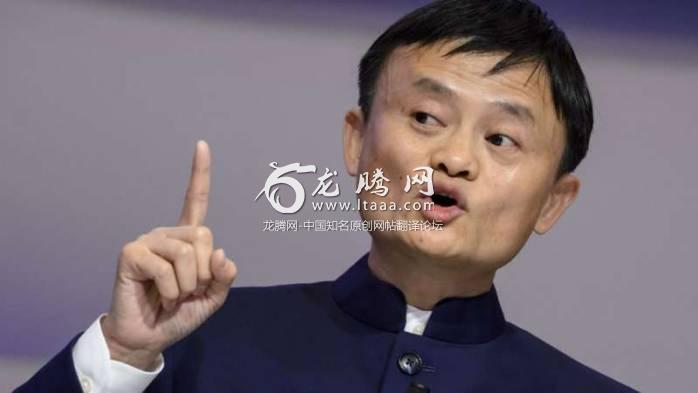马云:我们必须停止将我们的孩子训练成制作业员工。 [美国媒体]
马云知道人工智能将完全改变这个世界。阿里巴巴的创始人和董事长不认为我们应该惧怕AI。但是还是应该为就业市场的巨大中断做好准备。
Jack Ma: We need to stop training our kids for manufacturing jobs
马云:我们必须停止将我们的孩子训练成制作业员工。
Jack Ma knows artificial intelligence will change the world.
The Alibaba founder and chairman doesn't think we should be scared. But he does think we should be prepared for major disruptions to the job market.
马云知道人工智能将完全改变这个世界。阿里巴巴的创始人和董事长不认为我们应该惧怕AI。但是还是应该为就业市场的巨大中断做好准备。
"In the last 200 years, manufacturing [has brought] jobs. But today -- because of the artificial intelligence, because of the robots -- manufacturing is no longer the main engine of creating jobs," Ma said Wednesday in a speech at the Bloomberg Global Business Forum in New York City.
“在过去的200年里,制造业为我们带来了工作。但是在今天--因为人工智能的诞生,因为机器人的诞生--制作业已经不是提供就业机会的主要引擎了,”马云周三在纽约的彭博全球商业论坛的一场演讲中讲到。
Moving forward, Ma said he believes the service industry will be the largest engine of job creation.
着眼于未来,马云认为服务业将会是为社会提供就业机会最大的引擎。
Ma's stance is starkly different from the economic vision espoused President Donald Trump, who campaigned on an "America First" populist agenda and has repeatedly made promises to restore U.S. manufacturing jobs.
马云的立场和总统唐纳德特朗普的经济愿景有着很大的不同,特朗普在竞选总统时候曾经以“美国优先”的民粹政策作为自己的竞选手段并多次向人们承诺他就会把制造业工作带回美国。
"Talking about manufacturing, we should not be talking Made in China, Made in America," Ma said. "It's going to be 'Made in Internet.'"
“讲到制造业,我们讨论的不应该是中国制造或者美国制造,”马云表示。“这将会是个‘互联网制造’的年代”。
But Ma sees a major obstacle: He doesn't believe the world's current approach to education properly prepares today's youth for the realities of tomorrow's work.
但是马云看到了一个主要的障碍:他不认为当今世界的教育方式能让今天的年轻人为将来的就业市场做好准备。
"The way we teach ... is going to be making our kids [lose] jobs [in] the next 30 years," he said. He noted that when it comes to tasks like calculation, machines will always "do better."
“我们的教育方式....将让我们的孩子在未来的30年里失去工作的机会,”他表示。他注意到当涉及到一些计算的工作时,机器们总是能“做得更好”。
The key to keeping human workers relevant will be emphasizing imagination, according to Ma.
让人类员工参与其中的关键是突出利用我们人类的想象力,据马云介绍。
"We have to teach our kids to be very, very innovative, very creative," he said. "In this way, we can create jobs for our own kids."
“我们必须把我们的孩子教导得非常,非常有创新力,非常得有创意,”他讲到。“只有这样,我们才能为我们的孩子创造出工作机会。”
When it comes to artificial intelligence, Ma positions himself a realist -- but also as an optimist.
当讲到人工智能时,马云将自己定位为一个现实主义者--但同时也是个乐观主义者。
"The new technology will destroy a lot of jobs. But it will also create a lot of jobs," he said. "The question is whether we are ready and whether we are qualified for these new jobs."
“新的技术会摧毁很多的工作机会。但是同时它也会创造很多的工作,”他讲到。“问题的关键是我们是否做好了准备和我们是否能够胜任那些新的工作。”
In the meantime, there shouldn't be widespread anxiety about a war between humans and machines, Ma said. Computers will never have mastery over "wisdom" or "love," giving human a perpetual advantage.
与此同时,我们不应该对人类与机器人之间的战争感到焦虑。电脑永远都不会掌握“智慧”或者“爱” , 这对我们人类来说是个永恒的优势,马云表示。
"Human beings should have the self-confidence," he said. "Human being have the wisdom. Machine[s do] not have the wisdom."
“我们人类应该具有那份自信心,”他讲到。“人类拥有智慧,机器们不会拥有智慧。”
It's a different view of artificial intelligence than the one promoted by Tesla (TSLA) CEO Elon Musk. Earlier this month, Musk tweeted that he believes AI will cause World War III as nations compete over the technology.
这和特斯拉CEO埃隆·马斯克关于AI的看法很不一样。这个月早些时候,马斯克在推特是发声表示他相信随着各国在相关技术领域的激烈竞争,AI将会引发第三次世界大战。
Musk has long warned about the risks of AI. He signed a letter in August asking the United Nations to ban autonomous weapons and now heads the startup Neuralink, which is working to connect the human brain to computers. Musk figures that since nobody is heeding his warnings about AI, he may as well develop the technology in a way that will benefit society.
马斯克很早以前就警告过人们关于AI的风险。在8月的时候他签署了一份公开信,要求联合国禁止自动武器。并且现在他领导着一家叫做Neuralink的新兴公司,该公司致力于将人脑与电脑相互连接。马斯克发觉没有人听从了他关于AI的警告,所以他倒不如开发一些可能在此方面有益于社会的技术。
Ma's understanding of the future -- particularly the future of human conflict -- offers up a bit more hope.
马云对于未来的理解--特别是未来人类间的冲突-展现了更多一些的希望。
"I'm optimistic -- positive -- for the future for the technology," he said. "But we also have to be very, very careful. The first technology revolution caused World War I. Second technology revolution caused World War II. Now, we're in the third technology revolution. The World War III should be against poverty, disease and environment pollutions."
“对于科技的未来,我是很乐观的,也很积极,”他表示。“但是我们依然不能够太过掉以轻心。第一次技术革命引发了第一次世界大战,第二次技术革命引发了二战。现在,我们正处于第三次技术革命。我希望这第三次世界大战是针对贫困,疾病和环境污染的战争。”
版权声明
我们致力于传递世界各地老百姓最真实、最直接、最详尽的对中国的看法
【版权与免责声明】如发现内容存在版权问题,烦请提供相关信息发邮件,
我们将及时沟通与处理。本站内容除非来源注明五毛网,否则均为网友转载,涉及言论、版权与本站无关。
本文仅代表作者观点,不代表本站立场。
本文来自网络,如有侵权及时联系本网站。
图文文章RECOMMEND
热门文章HOT NEWS
-
1
Why do most people who have a positive view of China have been to ...
- 2
- 3
- 4
- 5
- 6
- 7
- 8
- 9
- 10
推荐文章HOT NEWS
-
1
Why do most people who have a positive view of China have been to ...
- 2
- 3
- 4
- 5
- 6
- 7
- 8
- 9
- 10











